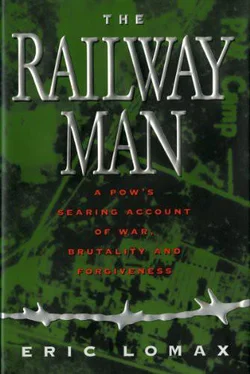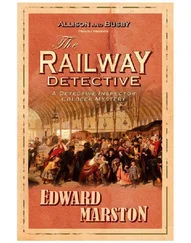Eric Lomax - The Railway Man
Здесь есть возможность читать онлайн «Eric Lomax - The Railway Man» весь текст электронной книги совершенно бесплатно (целиком полную версию без сокращений). В некоторых случаях можно слушать аудио, скачать через торрент в формате fb2 и присутствует краткое содержание. Город: New York, Год выпуска: 1995, ISBN: 1995, Издательство: W.W. Norton & Company, Жанр: Биографии и Мемуары, nonf_military, на английском языке. Описание произведения, (предисловие) а так же отзывы посетителей доступны на портале библиотеки ЛибКат.
- Название:The Railway Man
- Автор:
- Издательство:W.W. Norton & Company
- Жанр:
- Год:1995
- Город:New York
- ISBN:0393039102
- Рейтинг книги:4 / 5. Голосов: 1
-
Избранное:Добавить в избранное
- Отзывы:
-
Ваша оценка:
- 80
- 1
- 2
- 3
- 4
- 5
The Railway Man: краткое содержание, описание и аннотация
Предлагаем к чтению аннотацию, описание, краткое содержание или предисловие (зависит от того, что написал сам автор книги «The Railway Man»). Если вы не нашли необходимую информацию о книге — напишите в комментариях, мы постараемся отыскать её.
is a powerful tale of survival and of the human capacity to understand even those who have done us unthinkable harm.
The Railway Man — читать онлайн бесплатно полную книгу (весь текст) целиком
Ниже представлен текст книги, разбитый по страницам. Система сохранения места последней прочитанной страницы, позволяет с удобством читать онлайн бесплатно книгу «The Railway Man», без необходимости каждый раз заново искать на чём Вы остановились. Поставьте закладку, и сможете в любой момент перейти на страницу, на которой закончили чтение.
Интервал:
Закладка:
Joppa was unfortunately for my awakening fascination for vehicles that ran on rails, a tram heaven. It was a terminus on one of the last cable tram systems in the world, its cars attached to their bases by ropes of steel wire up to five miles long running in a conduit between the rails, the cables paid out by big stationary steam engines in the depots. Soon after the revelation of the massed tram cars, my father took me to see an oily trench below the surface of the roadway at the Joppa terminus. This chamber was the cable pit, and in it was a large flanged wheel round which a steel hawser revolved, pulling in the car from Portobello, the nearest suburb to the west. Every few minutes a tram would arrive, detach itself from the eastbound cable and, after gripping the westbound cable, head back to Edinburgh at a stately twelve miles an hour.
There was something infinitely reassuring in the predictability of this system: the heavy double-decked trams drawn through the streets, moving widely but never randomly around the town, cruising steadily through the mill of bicycles, horse-drawn delivery wagons and pedestrians. It was as though the trams laid down an orderly grid on the chaotic life of the city.
The antiquated cable vehicles gave way, soon after I became aware of them, to electric trams. When I was about four, I was with my mother on the promenade when she pointed out what she told me was the first electric tram heading for Edinburgh. The big steam engine in the local depot shuddered to a halt late at night about a month later. My father told me about it the following day; I could tell that to him this was a solemn moment, the end of something, and that it made him sad.
As children we loved playing on and riding the trams, learning the personalities of the conductors, some of them not exactly friendly to boys, and discovering that the drivers now had personalities too, for the fixed jogging pace of the old cable trams was a thing of the past and some of the drivers put the handle down and ran their sparking wagons like demons. A tram one day jumped the rails on the curve of King’s Road in Portobello, broke through the wall of Portobello Power station yard and ended up hanging over the railway line that fed the power station with coal. It was a sight, that big green tram car poised so weirdly out of place: a hint that orderly communication between one place and another could be violently interrupted, that the world could be a dangerous place. Still, electric trams were progress, and every advance was greeted in those severe and frugal years with more acclaim than regret. We were entranced by progress, in a way no-one now is. Little did I know where it was taking me.
My mother was not so taken with mechanical wonders, which is not surprising in someone who grew up one hundred and fifty miles from the northern Scottish coast, in the Shetland Islands. She was a very gentle woman, with a dignified manner and a visionary quality that I’ve always associated with her growing up in a community which still spoke a dialect of Norse. She was the fifth of eight children. No greater contrast with my father’s background can be imagined. Generations of her family had gone to sea in small fishing boats. Her father had built up a substantial fish business, had come south and was a prosperous man in Leith, Edinburgh’s port, by the time he died in the year before my birth.
My mother’s dreams and traditions were also very different from my father’s. She talked about lonely crofts, herring fishing, peat fires and the never ending sound of the sea; she described a Slimmer daylight that lasted twenty-four hours, hay-making, banks of sea-pinks on the white mica-sand beaches; and the ferocious winds that rip everything but the most twisted and flexible forms of life out of the ground in the winter months. Her family, the Sutherlands, had their own chronicle of disaster: her ancestor John Sutherland was one of 105 fishermen drowned in 1832 when eighteen open boats were overwhelmed in a July storm; and two more Sutherland men were lost in another Shetland summer storm in 1881. The family lived close to death in a way that city people could not understand. My mother nurtured the romanticism of a person displaced from a hard rural community, though she knew there was no going back. For all that, she was probably homesick throughout her life in Edinburgh.
She gave her child a sense of mystery. Even the place-names of Shetland seemed intangibly beautiful: where else were there islands with names like Vaila, Trondra, Balta and Unst? My mother had modest literary ambitions, and wrote what she called ‘essays’ and poems; she read a lot of books. The dour realism of Arnold Bennett could not do justice to the extremes of an island imagination, and my mother’s favourite reading was probably the work of Jessie Margaret Edmonston Saxby, Shetland’s most famous writer, who she knew, and who was already in her late seventies when I was born. She would still be alive in the first year of the Second World War.
My mother cared for me deeply, and was probably over-protective of me, and a little possessive. I had a demanding streak, loved making lists, writing things down, collecting cuttings from newspapers, and my mother tolerated and encouraged all this and kept up a supply of stationery for me. She called me ‘The Peerie Professor’: ‘peerie’ was Shetland dialect for ‘little’. I loved her, but perhaps the kind of world into which I was born did not encourage identification with her nostalgia for the past; something harder bit into me and led me into my father’s world, and after all this was what was expected of boys in the 1920s.
One lasting effect of my mother’s influence was the situation of the house I was born in, on a terrace in Joppa that offered a magnificent view of the Firth of Forth. I think she wanted to be near a stretch of water that had no visible landfall, most of the time, and from our terrace you could look out the window over the sea, which was usually grey and cold. Its short restless waves sent a bracing chill into our bones, reminding us that we were lucky to be on firm ground, never quite allowing us to relax into the illusion that we were in command of the earth.
Childhood was a time of stem affection. I was sheltered by serious and old-fashioned people who cared for their ‘only child’, the term implying a slight misfortune, as though single children were deprived, the lucky product of some fault in the hereditary material. I may have been a surprise to my parents. And I’ve often thought that it was just as well there was only one of me.
My father had a carefully organized routine and I still have an image of him leaving the house each morning to catch the No. 20 electric tram to the GPO in Waterloo Place in Edinburgh. He was meticulous about timetables and journey times, a trait I have inherited, a need to know that I can arrive and depart predictably.
He took us on holidays, to places like Aberdour in Fife and Glenfarg in Perthshire, crossing the high and wide span of the Forth Bridge in a carriage drawn by one of the beautiful Atlantic locomotives of the former North British Railway. To be trundled across that bridge was to be moved through a ratding world of steel and cold air, the high cantilever towers soaring above us and the water far below, visible through the metal struts. The bridge was a greater wonder than the Pyramids, the most wonderful bridge in the world: as every Scottish boy knew, it was about a mile long, contained eight million rivets and employed twenty-nine men full time just to paint it.
When I was still very young, my father took us to Shetland. This was a real expedition, a five-hour train journey to Aberdeen for a night crossing by steamer to Lerwick. The steamer was called the St Sunniva, the pride of the sonorously named North of Scotland and Orkney and Shetland Steam Navigation Company Limited. It was an elegant vessel, a converted cruising yacht, well able for the North Sea.
Читать дальшеИнтервал:
Закладка:
Похожие книги на «The Railway Man»
Представляем Вашему вниманию похожие книги на «The Railway Man» списком для выбора. Мы отобрали схожую по названию и смыслу литературу в надежде предоставить читателям больше вариантов отыскать новые, интересные, ещё непрочитанные произведения.
Обсуждение, отзывы о книге «The Railway Man» и просто собственные мнения читателей. Оставьте ваши комментарии, напишите, что Вы думаете о произведении, его смысле или главных героях. Укажите что конкретно понравилось, а что нет, и почему Вы так считаете.












